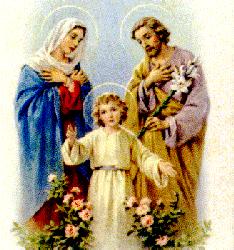Feast of the Holy Family

Nazareth is a kind of school where we may begin to discover what Christ’s life was like and even to understand his Gospel. Here we can observe and ponder the simple appeal of the way God’s Son came to be known, profound yet full of hidden meaning. And gradually we may even learn to imitate him.
Here we can learn to realize who Christ really is. And here we can sense and take account of the conditions and circumstances that surrounded and affected his life on earth: the places, the tenor of the times, the culture, the language, religious customs, in brief, everything which Jesus used to make himself known to the world. Here everything speaks to us, everything has meaning. Here we can learn the importance of spiritual discipline for all who wish to follow Christ and to live by the teachings of his Gospel.
How I would like to return to my childhood and attend the simple yet profound school that is Nazareth! How wonderful to be close to Mary, learning again the lesson of the true meaning of life, learning again God’s truths. But here we are only on pilgrimage. Time presses and I must set aside my desire to stay and carry on my education in the Gospel, for that education is never finished. But I cannot leave without recalling, briefly and in passing; some thoughts I take with me from Nazareth.
First, we learn from its silence. If only we could once again appreciate its great value. We need this wonderful state of mind, beset as we are by the cacophony of strident protests and conflicting claims so characteristic of these turbulent times. The silence of Nazareth should teach us how to meditate in peace and quiet, to reflect on the deeply spiritual, and to be open to the voice of God’s inner wisdom and the counsel of his true teachers. Nazareth can teach us the value of study and preparation, of meditation, of a well-ordered personal spiritual life, and of silent prayer that is known only to God.
Second, we learn about family life. May Nazareth serve as a model of what the family should be. May it show us the family’s holy and enduring character and exemplify its basic function in society: a community of love and sharing, beautiful for the problems it poses and the rewards it brings, in sum, the perfect setting for rearing children – and for this there is no substitute.
Finally, in Nazareth, the home of a craftsman’s son, we learn about work and the discipline it entails. I would especially like to recognize its value – demanding yet redeeming – and to give it proper respect. I would remind everyone that work has its own dignity. On the other hand, it is not an end in itself. Its value and free character, however, derive not only from its place in the economic system, as they say, but rather from the purpose it serves.
In closing, may I express my deep regard for people everywhere who work for a living. To them I would point out their great model, Christ their brother, our Lord and God, who is their prophet in every cause that promotes their well being.
~An address given at Nazareth by Pope Paul VI
Activities for Families to do Today:
Let us imitate the Holy Family in our Christian families, and our family will be a cell and a prefiguration of the heavenly family. Say a prayer dedicating your family to the Holy Family. Also pray for all families and for our country to uphold the sanctity of the marriage bond which is under attack.
Read more about Pope Leo XIII who instituted the Feast of the Holy Family and read his encyclical On Christian Marriage. You can also check out the Vatican's page of Papal documents on the Family.
Read the explanation of Jesus' knowledge in the activities section. Read Pope Pius X's Syllabus of Errors which condemns the modernist assertion that Christ did not always possess the consciousness of His Messianic dignity.
Have the whole family participate in cooking dinner. You might try a Lebanese meal. Some suggestions: stuffed grape leaves, stuffed cabbage rolls, lentils and rice, spinach and meat pies, chicken and dumplings, hummus, Lebanese bread, tabbouleh — a Lebanese salad and kibbi, a traditional Lebanese dish of specially ground meat mixed with spices and cracked wheat. This is the same kind of food that Mary served Jesus and St. Joseph. It's healthy and delicious.
Hat Tip: Catholic Culture




Comments
Post a Comment
Comments are moderated and are published at the blogger's discretion.